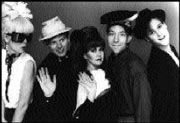I’m so glad 2001 is over, because saying sayonara to another year means I don’t have to worry about doing any more “Best of [fill in the date]” lists for another 12 months. Trying to distill a year’s worth of listening into a handful of titles is the least favorite aspect of my job, because when I compare my results against my esteemed colleagues’, I feel like a fraud. I never include the latest opus from Dylan, Springsteen, or Beck. I can’t help it. I’m contrary by nature, so if you tell me I should like an album, I’ll probably disregard it.
Which is why I used to hate the B-52’s.
By 1981, when I started high school, the Athens, Ga., hair hoppers had already released their first two albums. To my suburban Virginia classmates, 99 percent of whom only knew the band from “Rock Lobster” and their Saturday Night Live appearance, the B-52’s were synonymous with punk. Since I wore second-hand clothes and David Bowie badges, I, too, was “punk.” Ergo, everyone assumed I loved the B-52’s. Which meant I would have nothing to do with them.
Were it not for my friend Tony, who transferred to our school from San Jose, Calif., during my junior year, I might have resisted the B-52’s indefinitely. I would humor him when he insisted on popping Whammy! or Wild Planet into the tape deck of his pickup; better that than the ubiquitous Flashdance soundtrack. Then one night, to celebrate the purchase of my new boom box, Tony decided we should have an impromptu private dance party on the elementary-school playground. As I bounced around the jungle gym in the dark to “Dance This Mess Around,” listening to Cindy Wilson bleat, “Why won’t you dance with me?/ I ain’t no Limburger,” something clicked. I heard through the ridiculous lyrics to the palpable pathos and longing beneath.
In the liner notes to the new Nude on the Moon: the B-52’s Anthology (Rhino/ Warner Bros.), the two-CD set released to commemorate the band’s 25th anniversary on Valentine’s Day 2002, writer Michael Azerrad notes that “the band’s compositional method was based on scavenging.” Born from a drunken jam session, the group generated songs through improvisation, with primary instrumentalists Ricky Wilson and Keith Strickland making up musical accompaniment while Fred Schneider, Cindy Wilson, and Kate Pierson just sang whatever came into their wig-wearing heads.
Now I realize that what irked me about the B-52’s was the very thing that made their ditties work: that gift for tapping into a collective unconscious. They weren’t overtly concerned with being silly vs. serious, just creative and entertaining. Even as a teenager, I was obsessed with editing my poetry and prose, manicuring away all the rough edges—and often the germ of inspiration, too—as I wrote. The B-52’s did nothing of the sort. Only after hours of taped improvisation would Ricky and the others begin paring and shaping, thus preserving the raw impetus—however zany—of the original idea.
For several years after deciding it was OK to like the B-52’s, I’d tell people my favorite record by them was Mesopotamia, the six-song 1982 effort salvaged from sessions produced by David Byrne. Listening to the EP’s title cut and a previously unreleased early version of “Queen of Las Vegas” as I worked my way through the 35 selections of Nude on the Moon, it dawned on me that I had gotten it all wrong. The B-52’s were at their weakest, as on Mesopotamia or 1986’s sweet but disjointed Bouncing off the Satellites, when they tried too hard.
Which isn’t to suggest that the B-52’s had no business being serious. Nude on the Moon is packed with moments that resonate as powerfully today as that night I had my epiphany on the playground. When Kate wails “Something good will happen” on the environmental call to arms “Channel Z,” shivers still run through my body. But looking back, and reappraising clunkers like “Revolution Earth,” the trick for crafting a genuinely affecting B-52’s song is clearly not trying to.
I feel sorry for kids now, because it seems so unlikely that they’ll ever have a pop-culture revolution come along and pull the rug out from under them the way punk did for my generation. For misfit teens growing up in remote pockets of the U.S. circa 1979-1980, the B-52’s often provided the first inklings they weren’t alone. They primed my tender ears for Yoko Ono, Diamanda Galas, and other artists who continue to challenge and inspire me. I regret not letting the B-52’s truly work their magic on me when I was an impressionable youth. But now that I’m a crotchety adult and need the occasional shock in my shorts even more, Nude on the Moon makes me appreciate and cherish their accomplishments 10 times over.






